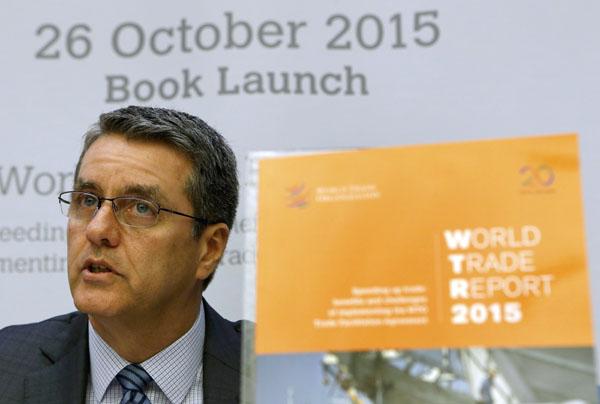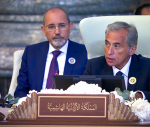You are here
Customs impasse is WTO's 'most serious crisis'
By AFP - Nov 08,2014 - Last updated at Nov 08,2014
BEIJING — An impasse over a global pact to streamline customs procedures poses "the most serious crisis the World Trade Organisation has faced" and has paralysed all negotiations in the trade body, its chief Roberto Azevedo said Saturday.
A draft of the so-called Trade Facilitation Agreement was hammered out last December during tough negotiations at a World Trade Organisation (WTO) conference in Bali — the WTO's first global accord since its 1995 founding.
But the WTO's 160 members failed in July to reach a final agreement on the deal, which Azevedo himself has said is crucial to ensuring the WTO's relevance.
"The impasse has effectively paralysed the multilateral negotiations in the organisation," Azevedo told reporters in Beijing.
"Substantial discussions on all the measures in the Bali package programme have come to a halt," he said. "I have described this impasse to members as the most serious crisis the WTO has faced,"
Azevedo was speaking on the sidelines of the 21-member Asia-Pacific Economic Cooperation (APEC) forum's annual gathering, hosted this year by China.
Members of the Geneva-based WTO set trade rules among themselves in an attempt to ensure a level playing field, and spur growth by opening markets and removing trade barriers including subsidies, excessive taxes and regulations.
The Bali negotiations were seen as make-or-break for its mission of achieving a worldwide trade agreement fair to both rich and poor nations, which Azevedo has said is under threat from proliferating bilateral and regional trade deals often skewed in favour of richer countries.
Bali was the WTO's first ever global agreement and signalled the first concrete progress on the Doha Round of trade liberalisation talks.
Those discussions, launched in 2001, aim to underpin development in poorer nations, but agreement has been elusive amid protectionist reflexes.
Negotiators instead extracted parts of the Doha package for the far less ambitious Bali customs accord, in the hope of creating momentum towards the wider agreement.
But the trade facilitation deal has been put on ice by post-Bali sparring between WTO members, notably over demands from India that the group approves the developing power's stockpiling of food.
It took nearly a decade to conclude the customs talks, which began in 2004, and Azevedo warned that the patience of many WTO members is "fast running out".
India and its developing-world supporters say food stockpiling is essential to ensure poor farmers and consumers survive in the cut-throat world of business.
Western countries, led by the United States, have raised concerns that such stocks could leak onto global markets, skewing trade.
Azevedo said US Trade Representative Michael Froman had told him talks between Washington and New Delhi on the issue had resumed.
"It seems, however that we still don't have a breakthrough in these bilateral talks," said Azevedo.
He plans to stress the severity of the situation again this week when he attends a summit of the Group of 20 (G-20) biggest economies, hosted by Australia.
Russia on Friday warned of the imminent "death" of the WTO if developed and developing nations don't come to an agreement at the upcoming G-20 summit in Australia.
Russian President Vladimir Putin will participate at the G-20 summit in Brisbane on November 15-16.
His representative at the summit, known as the G-20 sherpa, said the gathering will address a number of top issues like trade, stressing that the interests of developing nations would have to be taken into account.
"The process of negotiations within the framework of the WTO have practically ground to a halt," said G-20 sherpa Svetlana Lukash, noting that several key decisions of the global trade body have not been implemented.
She told reporters that it was necessary to find a solution that would take into account concerns of both developed and developing nations.
"If we don't find a way out of this dead-end at the G-20 summit this could jeopardise the entire system of multilateral trade," she said.
"In essence, it would mean... well... the death of the WTO," Lukash added. "It is a very important question. We are foreseeing rather heated discussions on this topic."
She also expressed Moscow's concern about the stalled reform of the International Monetary Fund (IMF).
"The most important thing for us is the reform of the IMF, a problem which has not yet been solved within the framework of the G-20," Lukash said.
She accused the United States of hampering the reform.
"Not only does it thwart the renewal of the IMF in line with today's realities which have seen a significant rise in the role of emerging economies, it also prevents the decisions to double the IMF capital from coming into force," Lukash indicated.
She warned that Russia and its BRICS partners would offer alternative proposals if a solution is not found by the end of the year.
Along with Russia, BRICS include emerging market nations Brazil, India, China and South Africa.
Russia is locked in a dramatic confrontation with the West over its support for separatists in eastern Ukraine.
The Russian strongman has repeatedly spoken out against what it calls Washington's desire to dominate world politics and economy, saying developing economies should have a greater say in global affairs.
Putin has accused Western nations of violating WTO rules by slapping sanctions against Russia.
Related Articles
India and the United States settled a dispute on Thursday that had paralysed the World Trade Organisation (WTO) and risked derailing a $1 trillion package of reforms of global customs procedures.
GENEVA — The benefits of a treaty that will cut red tape at borders and standardise customs procedures are much larger than previously thoug
NAIROBI — World Trade Organisation (WTO) member countries agreed to abolish agricultural export subsidies after five days of talks in Nairob
















